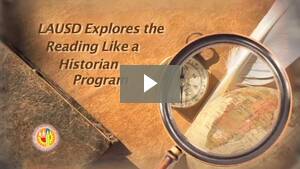History/Social Science Pre K-12
Page Navigation
- Home
- Contact Us
- About Us
- Division of Instruction Home page
- New History Framework
- Common Core State Standards
- Smarter Balanced Professional Development Resources
- Elementary (Kindergarten - 5th/6th)
- Middle School (6th - 8th)
- High School (9th - 12th)
- Reading Like a Historian
- Parents/Community
- Resources
- Interim Assessments & Blueprints
- Natural Disasters
- Service Learning
- Ethnic Studies Materials
- Los Angeles Unified School District
- Reading Like a Historian
Reading Like a Historian
-
In March of 2014, The Los Angeles Unified School District entered into a partnership with the Stanford History Education Group (now the Digital Inquiry Group) to bring the groundbreaking curriculum, Reading Like a Historian (RLH) to every Secondary History/Social Science classroom with in LAUSD.
The Reading Like a Historian (RLH) curriculum embodies the instructional shifts required by the Common Core State Standards. RLH makes disciplinary, historical inquiry accessible to diverse groups of learners. A disciplinary approach to history instruction engages students in the creation of historical knowledge. With this approach, students read closely, evaluate, and interpret historical sources in order to use text based evidence to reach a conclusion.The RLH curriculum includes four primary components of historical inquiry: 1) the introduction and application of relevant background knowledge; 2) investigation of central historical questions; 3) analysis of multiple documents and artifacts; and, 4) development of evidence-based claims through writing and discussion. The RLH approach represents a significant departure from typical history instruction. In order to be accessible to diverse groups of learners, particularly second language learners and struggling readers, the curriculum focuses on the following instructional strategies: primary and secondary source documents; using targeted guiding questions and graphic organizers; implementing explicit strategy instruction; supporting group discussions; and, engaging in formative assessment of student learning.



